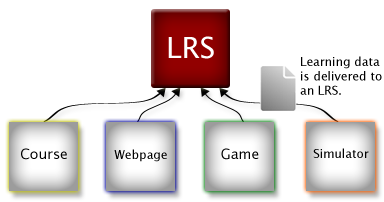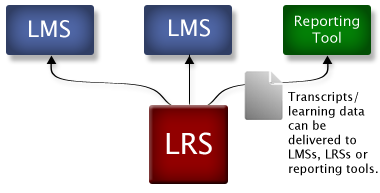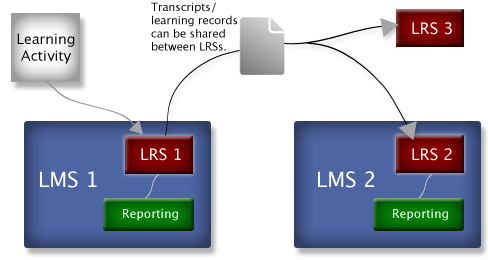Learning Record Store (LRS) = A place to store learning records
The LRS is the heart of any xAPI (Experience API) ecosystem; receiving, storing and returning data about learning experiences, achievements and job performance. You’ll need an LRS in order to do anything with xAPI. Every other tool which sends or retrieves learning activity data will interact with the LRS as the central store.
Learning Record Stores can be a standalone product or be part of a Learning Analytics Platform (LAP) that includes a range of reporting and analytics features. They can also be incorporated into an LMS. LRSs can communicate with one another, allowing for the portability of learning data across systems.
How is an LRS different from an LMS?
LRSs and LMSs are very different products. Whilst your LRS will likely replace and go beyond the reporting and analytics capability of your LMS, there are many other functions of the LMS that aren’t included in an LRS.
What does an LRS enable?
An LRS enables modern tracking of a wide variety of learning experiences, including real world activities, mobile apps and even job performance. Data from these experiences can be shared with other systems for reporting analytics and to support adaptive learning experiences. As the LRS collects data from a range of experiences, these sets of data can be compared and collated to evaluate the effectiveness of training programs and learning solutions.
How does a LRS work?
As learning activities are experienced, activity streams are sent to, and stored in, LRSs.

The data stored in an LRS can be accessed by LMSs, reporting tools or other LRSs and can be stored as individual learning records and/or entire transcripts. An LRS can limit who can read and write learning records, but doesn’t have to.

An LRS can live inside an LMS and work within that LMS’s capabilities. An LRS inside of an LMS can deliver learning data/transcripts to other LRSs, whether inside an LMS or independent of an LMS.

How can I get an LRS?
All of Rustici Software’s products support xAPI. SCORM Cloud contains a hosted LRS that accepts xAPI statements and Rustici Engine provides an installable LRS. We also offer Rustici LRS, a standalone LRS.